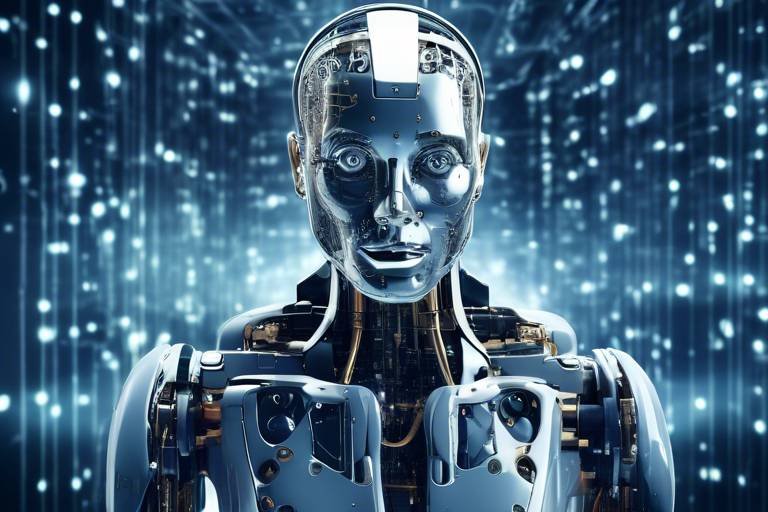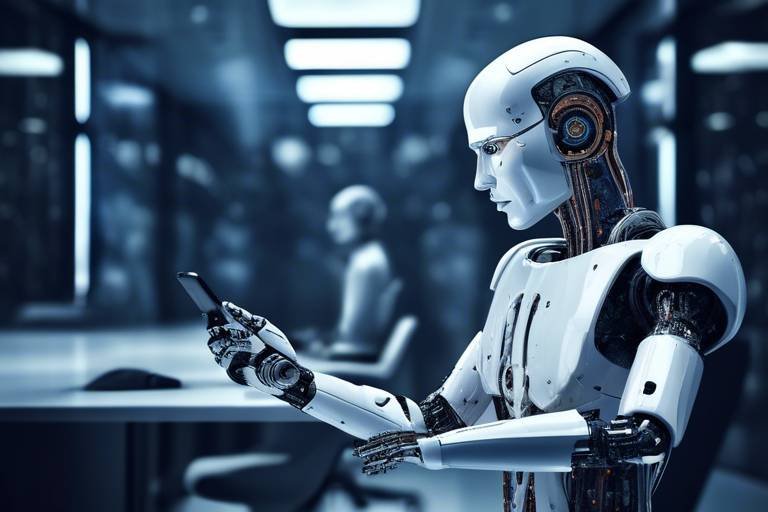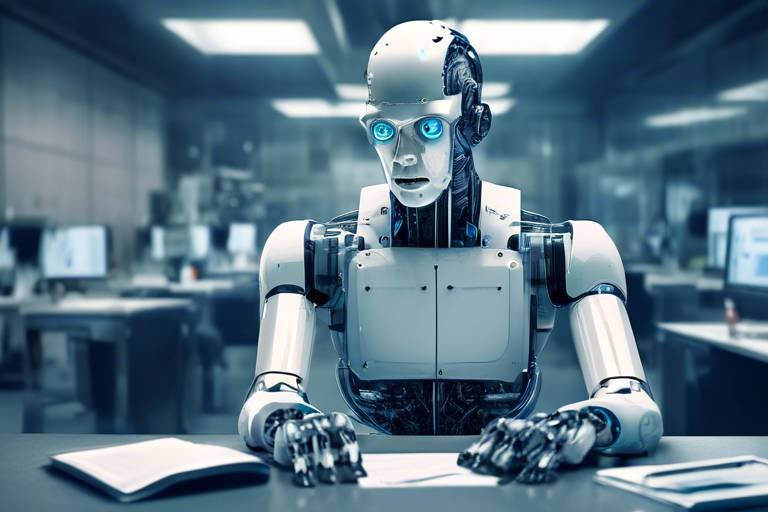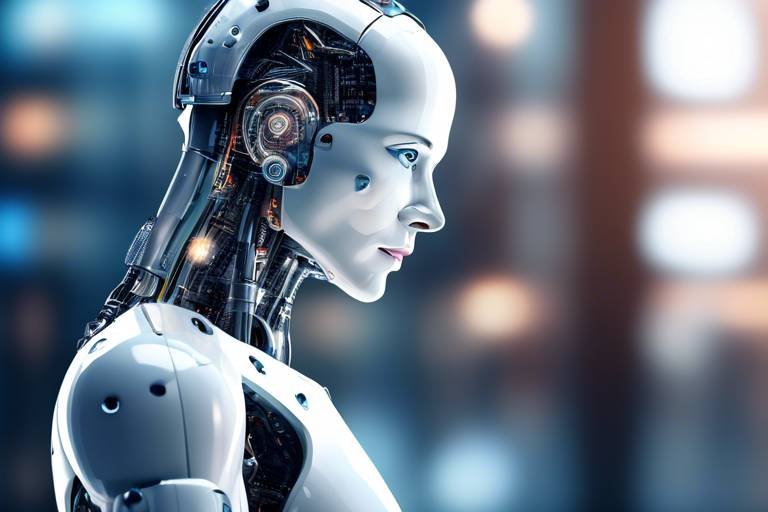Is AI the Future of Efficient Project Management?
The world of project management is undergoing a seismic shift, and at the heart of this transformation lies artificial intelligence (AI). Imagine a scenario where project managers no longer have to sift through endless spreadsheets, manually track deadlines, or struggle to communicate with team members scattered across various locations. Instead, they can leverage intelligent tools that not only streamline processes but also enhance decision-making. In this article, we will explore the transformative role of AI in project management, examining its benefits, challenges, and future implications for enhancing efficiency and effectiveness in various industries.
AI is not just a buzzword; it's a game-changer. It offers a plethora of advantages that can make project management not only easier but also more effective. But what exactly does this mean for professionals in the field? Let's dive deeper into how AI is reshaping project management and why it might just be the future we’ve all been waiting for.
From the initial planning stages to the final execution, AI tools are designed to assist project managers in every phase. They analyze vast amounts of data, predict potential outcomes, and optimize resource allocation, making it possible to create more accurate and efficient plans. This isn’t just about saving time; it’s about making informed decisions that lead to successful project completions.
As we navigate through this article, we'll uncover how AI enhances communication, manages risks, optimizes resources, and provides real-time analytics. Each of these components plays a crucial role in ensuring that projects are not only completed on time but also meet the desired quality standards.
So, is AI the future of efficient project management? The answer seems to be a resounding yes. However, it’s essential to consider the challenges that come with implementing such technologies. Resistance to change, data privacy concerns, and the need for proper training are just a few hurdles organizations may face. But fear not! The potential rewards far outweigh these challenges, and with the right strategies, organizations can harness the full power of AI.
In the following sections, we will delve into each aspect of AI in project management, providing insights and real-world examples to illustrate its impact. By the end of this article, you’ll have a clearer understanding of how AI can revolutionize the way projects are managed and why it’s time to embrace this technology for future success.
- What is AI in project management? - AI in project management refers to the use of artificial intelligence technologies to enhance project planning, execution, and monitoring processes.
- How does AI improve communication in project teams? - AI tools facilitate better communication by providing real-time updates and ensuring that all team members are aligned on project goals and timelines.
- What are the main challenges of implementing AI in project management? - Some challenges include resistance to change, data privacy concerns, and the need for adequate training for team members.
- Can AI help with risk management? - Yes, AI can predict potential risks by analyzing data and providing actionable insights to project managers.
- What are the future trends of AI in project management? - Emerging trends include further integration of AI, machine learning advancements, and increased automation in project management processes.

The Role of AI in Project Planning
In the fast-paced world of project management, the ability to plan effectively can make or break a project. This is where artificial intelligence (AI) steps in, transforming the traditional methods of project planning into something far more efficient and precise. Imagine having a supercharged assistant that can analyze mountains of data in seconds, predict timelines with uncanny accuracy, and allocate resources like a seasoned expert. Sounds like a dream, right? Well, this is the reality that AI brings to the table.
One of the most significant advantages of AI in project planning is its ability to analyze historical data. By sifting through past project data, AI tools can identify patterns and trends that may not be immediately apparent to human project managers. For instance, if a project consistently runs over budget due to unforeseen delays, AI can highlight these issues and suggest adjustments in future planning. This data-driven approach allows project managers to create more realistic timelines and budgets, ultimately leading to increased project success rates.
Furthermore, AI can enhance the resource allocation process. Imagine you’re managing a project with a tight deadline and limited resources. AI tools can evaluate the availability of team members, their skill sets, and the project requirements to optimize resource allocation. This means that instead of simply assigning tasks based on availability, managers can ensure that the right person is working on the right task at the right time. The result? A smoother workflow and a higher likelihood of meeting deadlines.
Another fascinating aspect of AI in project planning is its predictive capabilities. By utilizing machine learning algorithms, AI can forecast potential project outcomes based on various scenarios. For example, if a project encounters a delay due to unforeseen circumstances, AI can quickly analyze alternative paths and suggest adjustments to the project plan. This proactive approach not only saves time but also mitigates risks, allowing project managers to focus on what truly matters—delivering value to stakeholders.
However, it’s essential to recognize that while AI offers incredible tools for project planning, it is not a replacement for human intuition and experience. The best results come from a harmonious blend of AI capabilities and human insight. Project managers still play a crucial role in interpreting AI-generated data and making strategic decisions based on their understanding of the project dynamics.
In conclusion, the role of AI in project planning is transformative. By leveraging data analysis, optimizing resource allocation, and predicting project outcomes, AI empowers project managers to create plans that are not only more efficient but also more aligned with project goals. As we move forward, embracing these technologies will be key to staying competitive in an ever-evolving landscape.

Enhancing Communication with AI
Effective communication is the backbone of successful project management. Imagine a scenario where team members are not on the same page, deadlines are missed, and confusion reigns supreme. Sounds chaotic, right? This is where artificial intelligence steps in to save the day! AI-driven tools are revolutionizing how teams communicate, ensuring that everyone stays informed and aligned throughout the project lifecycle.
One of the most significant advantages of AI in communication is its ability to provide real-time updates. With AI tools, project managers can disseminate information instantly, ensuring that team members are always aware of the latest developments. This is particularly crucial in fast-paced industries where decisions need to be made swiftly. For instance, AI chatbots can handle routine inquiries, allowing team members to focus on more complex issues rather than getting bogged down by repetitive questions.
Moreover, AI can analyze communication patterns to identify potential bottlenecks. By examining how information flows between team members, AI can pinpoint where misunderstandings occur and suggest improvements. For example, if a team member frequently misses updates, AI can recommend a change in communication strategy, such as utilizing a different platform or adjusting the frequency of updates.
Additionally, AI tools can facilitate collaboration across different locations and time zones. With the rise of remote work, teams are often scattered across the globe. AI-powered platforms can bridge this gap by providing a centralized hub for communication. Features like automated meeting scheduling, document sharing, and task assignments ensure that everyone is on the same page, regardless of where they are located. This is crucial for maintaining momentum and ensuring that projects stay on track.
To illustrate this, consider a project management tool that integrates AI capabilities. It can automatically summarize discussions, highlight action items, and even send reminders to team members about upcoming deadlines. This not only saves time but also enhances accountability, as everyone knows their responsibilities and timelines. In essence, AI acts as a virtual assistant, keeping the team organized and focused.
However, while AI can significantly enhance communication, it’s essential to strike a balance. Over-reliance on technology can lead to a disconnect in personal interactions. It’s vital for teams to complement AI tools with face-to-face or virtual meetings to foster relationships and build trust. After all, communication is not just about exchanging information; it’s also about understanding and connecting with one another.
In conclusion, the integration of AI in project management communication is not just a trend; it’s a game-changer. By leveraging AI tools, organizations can enhance collaboration, streamline information flow, and ultimately drive project success. As we move forward, embracing these technologies will be crucial for teams aiming to stay competitive and efficient in an ever-evolving landscape.
- How does AI improve communication in project management?
AI enhances communication by providing real-time updates, analyzing communication patterns, and facilitating collaboration among team members. - Can AI replace human interaction in project management?
No, while AI can streamline communication, it should complement human interactions to foster relationships and build trust. - What are some examples of AI tools used for communication?
Examples include AI chatbots, project management software with AI capabilities, and automated meeting scheduling tools.

AI for Risk Management
In the realm of project management, risk management is not just a checkbox on a to-do list; it’s a crucial element that can make or break a project's success. With the advent of artificial intelligence, the landscape of risk management is undergoing a significant transformation. AI technologies are now capable of analyzing vast amounts of data in real-time, enabling project managers to identify potential risks before they escalate into major issues. Imagine having a crystal ball that not only predicts the future but also provides actionable insights to mitigate risks—this is precisely what AI brings to the table.
One of the most remarkable capabilities of AI in risk management is its predictive analytics. By leveraging historical data and current project metrics, AI algorithms can forecast potential risks with impressive accuracy. For instance, if a project is behind schedule, AI can analyze various factors—such as team performance, resource allocation, and external dependencies—to determine the likelihood of further delays. This allows project managers to take proactive measures rather than reactive ones, which can save both time and resources.
Moreover, AI can categorize risks into different types, such as operational, financial, or strategic risks. This categorization helps project managers to prioritize their responses effectively. For example, operational risks may require immediate attention, while strategic risks could be monitored over time. The ability to prioritize risks ensures that project managers focus their efforts where they are most needed, enhancing overall project efficiency.
To illustrate the impact of AI in risk management, consider the following
:| Risk Type | AI Analysis Method | Actionable Insight |
|---|---|---|
| Operational | Real-time performance monitoring | Adjust resource allocation to prevent bottlenecks |
| Financial | Trend analysis of budget vs. actuals | Reallocate funds to high-priority tasks |
| Strategic | Scenario modeling | Develop contingency plans for potential market shifts |
Additionally, AI tools can facilitate collaboration among team members when it comes to risk management. By providing a centralized platform for risk assessment, team members can contribute their insights and expertise, creating a comprehensive risk profile. This collaborative approach not only enhances the quality of risk management but also fosters a culture of transparency and accountability within the team.
However, it’s essential to recognize that while AI can significantly enhance risk management, it’s not a magic solution. Project managers still need to apply their judgment and expertise when interpreting AI-generated insights. The best outcomes arise when AI complements human intuition rather than replacing it. By combining the analytical power of AI with the nuanced understanding of experienced project managers, organizations can navigate risks more effectively, leading to successful project outcomes.
In conclusion, AI is revolutionizing risk management in project management. By providing predictive analytics, categorizing risks, and facilitating collaboration, AI empowers project managers to identify and mitigate risks proactively. As organizations continue to integrate AI into their project management practices, the potential for improved project outcomes becomes increasingly evident.
- How does AI predict project risks? AI uses historical data and current project metrics to analyze trends and forecast potential risks.
- Can AI completely replace human project managers? No, AI is a tool that enhances decision-making but should be used in conjunction with human expertise.
- What types of risks can AI help manage? AI can help manage operational, financial, and strategic risks, among others.
- Is AI implementation in risk management costly? While there may be initial costs, the long-term savings and efficiencies gained often outweigh these expenses.

Resource Allocation and Optimization
In the fast-paced world of project management, efficient resource allocation is not just a luxury; it's a necessity. Imagine trying to build a skyscraper with a limited number of bricks and not knowing where to place each one. That’s where artificial intelligence (AI) comes into play, revolutionizing how resources are allocated and optimized across various projects. AI tools can analyze vast amounts of data, including past project performances, team member skills, and resource availability, to create a blueprint for success.
One of the standout features of AI in resource allocation is its ability to predict project requirements. By leveraging historical data and machine learning algorithms, AI can forecast the necessary resources needed at different stages of a project. This means project managers can allocate resources more effectively, ensuring that every team member is utilized to their fullest potential. For instance, if a project requires a specific skill set at a particular phase, AI can pinpoint the right team members and allocate them accordingly, minimizing downtime and maximizing productivity.
Moreover, AI-driven tools can continuously monitor resource usage throughout the project lifecycle. This real-time tracking allows project managers to make informed decisions quickly. If a resource is being underutilized or if a bottleneck is detected, adjustments can be made on the fly. This level of flexibility is invaluable, especially in industries where project scopes can change rapidly. For example:
| Resource Type | Utilization Rate | Action Needed |
|---|---|---|
| Developers | 75% | Reassign to new tasks |
| Designers | 50% | Increase workload |
| Marketing | 90% | Consider hiring temporary help |
This table illustrates how AI can provide insights into resource utilization, guiding project managers on necessary actions to optimize their teams effectively. Additionally, AI tools can help in identifying overlapping skills among team members, enabling managers to consolidate roles and streamline processes. This not only reduces costs but also fosters a more collaborative environment where team members can share responsibilities and learn from one another.
However, it's important to recognize that while AI enhances resource allocation, it is not a magic bullet. The human element in project management remains crucial. Project managers must interpret AI-generated insights and make strategic decisions that align with the project's goals and the organization’s vision. The synergy between human expertise and AI capabilities can lead to unparalleled efficiency and effectiveness in project management.
In conclusion, the integration of AI in resource allocation and optimization is transforming the landscape of project management. By harnessing the power of AI, organizations can ensure that their resources are utilized effectively, projects are completed on time, and budgets are adhered to. As we look to the future, the collaboration between human intuition and AI precision will pave the way for smarter project management practices.
- How does AI improve resource allocation?
AI analyzes historical data and predicts future resource needs, allowing for more efficient allocation. - Can AI adapt to changing project requirements?
Yes, AI tools can continuously monitor resource usage and adjust allocations in real-time. - What role does human intuition play in AI-driven resource management?
Human expertise is essential for interpreting AI insights and making strategic decisions.

AI-Powered Analytics and Reporting
In today's fast-paced project management landscape, data-driven decision-making is more crucial than ever. With the sheer volume of data generated throughout a project's lifecycle, manual analysis can be overwhelming and often leads to inaccuracies. This is where AI-powered analytics comes into play, transforming how project managers approach reporting and analysis. Imagine having a tool that not only gathers data but also interprets it, providing insights that can significantly influence project outcomes. Sounds like a game changer, right?
AI tools leverage advanced algorithms to analyze historical and real-time data, allowing project managers to track progress against key performance indicators (KPIs). For instance, instead of sifting through spreadsheets and reports, managers can use AI to generate real-time dashboards that visually represent project metrics. This not only saves time but also enhances clarity, enabling teams to make informed decisions quickly.
One of the standout features of AI-powered analytics is its ability to predict future project trends based on past performance. By analyzing patterns in data, AI can forecast potential delays, budget overruns, and resource shortages. This predictive capability empowers project managers to proactively address issues before they escalate, ultimately leading to more successful project outcomes. To illustrate this, consider the following table that summarizes the benefits of AI in analytics:
| Benefit | Description |
|---|---|
| Real-Time Insights | Provides immediate access to project data, allowing for timely decision-making. |
| Predictive Analytics | Forecasts potential issues based on historical data, enabling proactive management. |
| Enhanced Reporting | Automates the generation of reports, reducing manual effort and errors. |
| Data Visualization | Transforms complex data into easy-to-understand visual formats, increasing comprehension. |
Moreover, AI-powered reporting tools can automate the generation of comprehensive reports, eliminating the tedious task of manual report writing. Imagine a world where your reports are automatically compiled and formatted, ready to be shared with stakeholders at the click of a button. This not only boosts productivity but also ensures that all team members are on the same page, with access to the latest information.
However, it’s essential to recognize that while AI can enhance analytics and reporting, it’s not a magic bullet. The effectiveness of these tools heavily relies on the quality of the data fed into them. Poor data quality can lead to misleading insights, which can ultimately derail a project. Therefore, organizations must invest in proper data management practices to reap the full benefits of AI analytics.
In conclusion, the integration of AI-powered analytics and reporting into project management practices represents a significant leap forward. By providing actionable insights, real-time data, and streamlined reporting processes, AI not only enhances efficiency but also empowers project managers to make smarter, more informed decisions. As we continue to embrace these technologies, the future of project management looks brighter than ever.
- What is AI-powered analytics? AI-powered analytics refers to the use of artificial intelligence technologies to analyze data and generate insights that assist in decision-making.
- How can AI improve project reporting? AI can automate report generation, provide real-time insights, and enhance data visualization, making reporting more efficient and accurate.
- Are there any risks associated with AI analytics? Yes, the main risks include reliance on poor-quality data, which can lead to inaccurate insights, and potential resistance from team members to adopt new technologies.
- What should organizations consider when implementing AI tools? Organizations should ensure data quality, provide adequate training for team members, and consider the specific needs of their projects when selecting AI tools.

Challenges of Implementing AI in Project Management
As organizations increasingly turn to artificial intelligence for enhancing project management, it's essential to recognize the challenges that come with this transition. While the potential benefits of AI are vast, the road to successful implementation is often fraught with obstacles that can hinder progress and limit effectiveness. One of the primary challenges is the resistance to change. Many team members may feel apprehensive about adopting new technologies, fearing that AI will replace their roles or complicate existing workflows. This fear can lead to a lack of engagement with the AI tools, ultimately undermining their intended benefits.
Another significant hurdle is data privacy concerns. As AI systems rely heavily on data to function effectively, organizations must ensure that they are handling sensitive information responsibly. This is particularly crucial in industries where data breaches can lead to severe consequences, both legally and financially. Moreover, companies need to comply with regulations such as GDPR, which can complicate the implementation of AI solutions.
Training is also a critical factor in the successful adoption of AI in project management. Many project managers and team members may not possess the necessary skills to utilize AI tools effectively. This skills gap can create a bottleneck, where the potential of AI remains untapped due to a lack of understanding. Organizations need to invest in comprehensive training programs to equip their teams with the knowledge and skills required to leverage AI technologies fully.
Furthermore, the integration of AI into existing project management systems can be a daunting task. Compatibility issues may arise, leading to disruptions in workflow and productivity. Organizations must carefully evaluate their current systems and choose AI solutions that can seamlessly integrate without causing significant disruptions. This process often requires a considerable investment of time and resources.
In summary, while AI holds tremendous potential for transforming project management, organizations must navigate several challenges to harness its full capabilities. Addressing resistance to change, ensuring data privacy, providing adequate training, and managing integration complexities are all crucial steps in successfully implementing AI in project management.
- What are the main challenges of implementing AI in project management? The main challenges include resistance to change, data privacy concerns, the need for training, and integration issues with existing systems.
- How can organizations overcome resistance to AI? Organizations can overcome resistance by involving team members in the AI implementation process, providing clear communication about the benefits, and offering training to build confidence in using new tools.
- What role does training play in AI adoption? Training is crucial as it equips team members with the necessary skills to use AI tools effectively, ensuring that the organization can fully benefit from AI technologies.
- Are there any legal concerns with using AI? Yes, organizations must comply with data protection regulations, such as GDPR, to ensure that they handle sensitive information responsibly and avoid legal repercussions.

Future Trends in AI and Project Management
As we look ahead, the landscape of project management is poised for a seismic shift, largely driven by the rapid advancements in artificial intelligence. The integration of AI technologies is not just a passing trend; it represents a fundamental change in how projects are planned, executed, and evaluated. Imagine a world where project managers have access to intelligent systems that can predict outcomes, optimize workflows, and enhance team collaboration. Sounds futuristic, right? But it's happening now!
One of the most exciting trends is the rise of machine learning algorithms that analyze past project data to forecast future performance. These algorithms can identify patterns that human analysts might overlook, enabling project managers to make data-driven decisions with unprecedented accuracy. For instance, by examining historical project timelines and resource allocations, AI can suggest realistic deadlines and resource needs for new projects. This predictive capability not only enhances planning but also reduces the likelihood of project overruns.
Another trend gaining momentum is the use of automation in repetitive tasks. Imagine a project manager who no longer has to spend hours updating spreadsheets or sending reminders. With AI-driven tools, these mundane tasks can be automated, allowing project managers to focus on strategic decision-making and team leadership. Automation can streamline processes such as scheduling meetings, tracking progress, and generating reports, making project management more efficient than ever.
Furthermore, the integration of collaborative AI tools is transforming team dynamics. These tools facilitate real-time communication and knowledge sharing among team members, regardless of their geographical locations. For example, AI chatbots can provide instant answers to common questions, while virtual assistants can help manage tasks and deadlines, ensuring that everyone is on the same page. This level of connectivity fosters a more cohesive work environment, which is essential for project success.
However, with these advancements come challenges that organizations must navigate. The need for data privacy and security is paramount, especially as more sensitive information is handled by AI systems. Organizations must ensure that they have robust protocols in place to protect their data and comply with regulations. Additionally, the workforce will need training to adapt to these new technologies, as the success of AI in project management depends on human-AI collaboration.
In summary, the future of AI in project management is bright and full of potential. As organizations embrace these technologies, they will not only enhance their project outcomes but also redefine the very nature of project management itself. By leveraging AI's capabilities, project managers can expect to see improvements in efficiency, communication, and decision-making, ultimately leading to greater project success.
- What is the role of AI in project management? AI helps streamline processes, enhance communication, and improve decision-making by analyzing data and predicting outcomes.
- How can AI improve project planning? AI tools can analyze historical data to provide more accurate timelines and optimize resource allocation.
- What challenges does AI face in project management? Key challenges include data privacy concerns, resistance to change, and the need for adequate training.
- What are some examples of AI tools used in project management? Tools like Trello, Asana, and Monday.com are integrating AI features to enhance functionality and user experience.

Case Studies of AI in Project Management
To truly grasp the transformative power of AI in project management, it's essential to look at real-world examples where organizations have harnessed this technology to enhance their project outcomes. One notable case is that of a major construction firm, XYZ Builders, which faced significant delays and budget overruns in their projects. By integrating an AI-driven project management tool, they were able to analyze historical data and predict potential bottlenecks before they occurred. This proactive approach not only helped them complete projects ahead of schedule but also reduced costs by an impressive 20%.
Another compelling example comes from a software development company, ABC Tech, which struggled with team communication and task allocation. They implemented an AI-based communication platform that utilized natural language processing to analyze team interactions. The tool provided insights into team dynamics, highlighting areas where communication was lacking. As a result, project managers could adjust workflows and ensure that team members were on the same page. Within just a few months, ABC Tech reported a 30% increase in project delivery speed and significantly improved team morale.
In the healthcare sector, a hospital network, HealthFirst, adopted AI to manage their extensive range of projects, from infrastructure upgrades to IT system implementations. By using AI analytics, they could prioritize projects based on patient care impact and resource availability. This data-driven approach allowed them to allocate resources more efficiently and ensure that critical projects were completed on time. The outcome? A remarkable 15% improvement in patient satisfaction scores, as projects that directly affected patient care were expedited.
Moreover, a marketing agency, Creative Minds, leveraged AI tools to optimize their project management processes. They utilized machine learning algorithms to analyze past campaign data, enabling them to predict which strategies would yield the best results. This not only improved their project planning but also enhanced their client satisfaction rates. The agency saw a 40% increase in repeat business, showcasing how AI can directly influence profitability and client relationships.
These case studies illustrate that the integration of AI in project management is not just a trend; it’s a necessity for organizations aiming to stay competitive in today's fast-paced environment. As we delve deeper into the future of project management, it's clear that the organizations that embrace AI will be the ones leading the charge toward greater efficiency and success.
- What industries can benefit from AI in project management?
Almost any industry can leverage AI, including construction, healthcare, technology, and marketing, as illustrated in the case studies above. - How does AI improve project planning?
AI analyzes historical data to predict timelines and identify potential risks, helping project managers create more accurate and efficient plans. - Are there any challenges to implementing AI in project management?
Yes, challenges include resistance to change, data privacy concerns, and the need for adequate training. - What is the future of AI in project management?
The future includes deeper integration of AI tools, machine learning advancements, and automation, which will reshape project management practices.

Conclusion: Embracing AI for Project Success
As we wrap up our exploration of the transformative power of artificial intelligence in project management, it's clear that embracing AI is not just a trend—it's a necessity for organizations aiming to thrive in today's fast-paced environment. The potential for AI to enhance efficiency, streamline processes, and improve outcomes is monumental. By integrating AI technologies, project managers can unlock a treasure trove of benefits that were previously unimaginable.
Imagine a world where project planning is not just about guesswork but is backed by data-driven insights. AI can analyze historical data, predict timelines, and even suggest optimal resource allocation, allowing project managers to create plans that are not only more accurate but also more achievable. This shift from intuition-based planning to data-driven decision making is akin to moving from sailing a ship by the stars to navigating with a GPS—it's a game changer!
Moreover, effective communication is the lifeblood of any successful project. AI-driven tools can facilitate seamless communication among team members, ensuring that everyone is on the same page. This level of connectivity can reduce misunderstandings and enhance collaboration, making the project lifecycle smoother and more productive.
However, it's essential to recognize that the journey to integrating AI in project management isn't without its challenges. Organizations may face hurdles such as resistance to change, concerns about data privacy, and the need for comprehensive training. Addressing these challenges head-on is crucial for a successful transition.
Looking ahead, the future of project management is bright with AI advancements. With trends like machine learning and automation gaining traction, the opportunities for improvement are limitless. Organizations that choose to embrace these technologies will not only enhance their project outcomes but will also position themselves as leaders in their respective industries.
In conclusion, the benefits of adopting AI in project management are clear. By leveraging AI tools and technologies, organizations can achieve significant improvements in efficiency, effectiveness, and overall project success. The time to embrace AI is now, and those who do will undoubtedly reap the rewards of a more streamlined, data-driven, and successful project management approach.
- What are the main benefits of using AI in project management?
AI enhances efficiency, improves communication, optimizes resource allocation, and provides real-time analytics, making project management more effective. - What challenges might organizations face when implementing AI?
Challenges include resistance to change, data privacy concerns, and the need for training and adaptation to new technologies. - How can AI improve project planning?
AI can analyze data to predict timelines and optimize resource allocation, leading to more accurate and efficient project plans. - What future trends should we expect in AI and project management?
Emerging trends include greater integration of AI tools, advancements in machine learning, and increased automation of project management tasks.
Frequently Asked Questions
- What is the role of AI in project planning?
AI plays a transformative role in project planning by analyzing vast amounts of data to predict timelines and optimize resource allocation. This means project managers can create more accurate and efficient plans, reducing the likelihood of delays and budget overruns.
- How does AI enhance communication in project management?
AI-driven tools facilitate better communication by ensuring that team members stay informed and aligned throughout the project lifecycle. These tools can automate updates and provide real-time feedback, making it easier for teams to collaborate effectively.
- Can AI help with risk management in projects?
Absolutely! AI algorithms can predict potential risks by analyzing historical data and current project parameters. This allows project managers to identify risks early and take proactive measures to mitigate them, ultimately leading to higher project success rates.
- How does AI optimize resource allocation?
AI enhances resource management by analyzing both resource availability and project requirements. This ensures that resources are allocated efficiently, helping to keep projects on schedule and within budget.
- What benefits do AI-powered analytics and reporting provide?
AI-powered analytics offer real-time insights into project progress, allowing project managers to make data-driven decisions. This capability helps in tracking performance and making necessary adjustments promptly, which is crucial for project success.
- What challenges might organizations face when implementing AI in project management?
Organizations may encounter several challenges, including resistance to change from team members, concerns about data privacy, and the need for training on new AI tools. Addressing these challenges is essential for successful AI integration.
- What are the future trends in AI and project management?
The future of project management is likely to be shaped by advancements in AI, including deeper integration of machine learning and automation. These trends will continue to transform how projects are managed, making them more efficient and effective.
- Can you provide examples of AI in project management?
Yes! There are numerous case studies showcasing organizations that have successfully implemented AI in their project management processes. These examples highlight improved outcomes, efficiency, and overall project success.
- Why should organizations embrace AI for project success?
Embracing AI can lead to significant improvements in both efficiency and effectiveness in project management. By adopting AI technologies, organizations can enhance their project outcomes and stay competitive in an increasingly digital landscape.



















